Advertiser Disclosure: I Will Teach You To Be Rich has partnered with CardRatings for our coverage of credit card products. I Will Teach You To Be Rich and CardRatings may receive a commission from card issuers.
Editorial Disclosure: Opinions, reviews, analyses & recommendations are the author’s alone, and have not been reviewed, endorsed or approved by any of these entities.
Sometimes we get dealt a bad hand and end up with a bad credit rating. Or maybe we’re trying to build up our credit rating for the first time.
Either way, we can find ourselves in a trap.
Credit card issuers want good credit scores in order to approve us for a new credit card. But we need a credit card to improve our credit.
I’ve got good news.
You have options. And these aren’t scammy deals that will take advantage of you. Even with bad credit, it’s still possible to get a credit card and rebuild your credit.
The Top 4 Cards for Building Credit
- Capital One QuicksilverOne Cash Rewards (Best Rewards Card While Building Credit)
- Capital One Spark Classic for Business (Best for Rebuilding Business Credit)
- Capital One Secured (Best Secured Card for Bad Credit)
- Journey Student Rewards from Capital One (Best for Students)
Jump ahead to
- The Best Credit Cards for Average Credit
- The Best Credit Cards for Bad Credit
- The Best Credit Cards for Students
- How to Choose The Right Card for Building Credit
- Credit Cards for Building Credit Reviews
The Best Credit Cards for Average Credit
- Capital One Platinum Credit Card
- Capital One QuicksilverOne Cash Rewards
- Capital One Spark Classic (Business)
If you have a decent credit history but can’t quite get the premium credit cards yet, start with a rewards card for folks with average credit.
Compared to the premium rewards cards, these cards offer fewer rewards at higher APRs. You’ll want to get in the habit of paying off your cards every month. So the APR shouldn’t matter.
So the only real difference between these cards and premium cards is that the rewards aren’t quite as good.
But it’s still something. And these cards help you build up your credit. You’ll build credit while earning some rewards along the way. That’s a great deal.
If you have a high enough credit score to get one of these cards, start here.
The Best Credit Cards for Bad Credit
Let’s say something happened and you now have bad credit. Every time you apply for a new credit card, you get denied.
Now what?
Even with bad credit, you still have options.
I recommend considering one of the secured credit cards. These cards are still credit cards so you will build up a credit history with them. If you always pay on time (which you should be doing), you’ll slowly improve your credit score and unlock better credit cards.
The difference if that you have to put a deposit down when you open the card. Depending on your credit score, the deposit usually ranges from $50 to $200. The bank holds onto this deposit and will keep it if you skip too many payments.
The deposit allows the bank to offer credit cards to a larger range of folks than a standard credit card.
Yes, it is inconvenient to save up enough for the deposit but it’s a better option than not having a credit card at all. Credit cards are the easiest ways to build your credit score which will get you better credit cards, more credit, and better interest rates on mortgages and loans. It’s definitely worth the effort.
The Best Credit Cards for Students
- Discover it Student Cash Back
- Discover it Student Chrome
- Journey Student Rewards from Capital One
- Deserve Edu MasterCard for Students
I was a student when I got my first credit card.
A bunch of bills hit me all at once, including some hefty maintenance on my pickup that I hadn’t planned for. I went from having a couple of hundred dollars in my checking account to being about $500 short of what I needed to pay all my bills.
So I went around town and applied for a credit card at every bank. They all turned me down.
Then I went to the credit union on campus that offered student credit cards. Their approvals department initially denied my application until the banker advocated for me. He got me approved at half their usual credit line for students.
After paying my bills with that credit card, I paid the card off on time and started building my credit score. A decade later, I have good enough credit to get just about any credit card I want.
When you’re a student, many banks will turn you away outright. That’s what happened to me. Going to a bank and choosing a student card can get you out of this trap. Student credit cards are designed for folks without any credit history and low to no income. As long as you’re a student, the requirements get much more flexible.
That’s how I got started.
Once you have your first card, pay if off every month to build your credit. Then in a few years, apply for a card for average credit scores to get your first rewards card. The point is not to be picky as a student, get any card that doesn’t have annual fees and use it to build your credit. Worry about the rewards and perks once you’ve built up your credit a bit.
How to Choose The Right Card for Building Credit
What’s the best way to right the best card for building your credit rating? Follow these steps.
1. Avoid Annual Fees
Lots of the premium credit cards have annual fees. They give rewards and perks which easily exceed the value of the fee.
But when you’re building credit, you’re not going to get the best rewards or perks. Your primary goal is to build up your credit rating so you can get access to the better credit cards later. Fees are only going to slow you down at this stage.
When I was building my credit up, I avoided fees entirely. That kept more money in my pocket and kept things really simple until I had a good enough credit score to get the premium credit cards. I recommend you do the same.
We’ve included reviews of some cards that have annual fees. Sometimes they offer rewards and it’s worth it. In other cases, they might be the last option available. Avoid fees if you can. And if you can’t, switch to a no-annual fee card as soon as you can once you’ve built up your credit score.
2. If You’re a Student, Get a Student Credit Card
As a student, you’re stuck in a catch-22.
You need a credit score in order to get a credit card. But you need a credit card in order to build a credit history and get a credit card. Breaking this cycle can get tricky.
These days, there are great credit card options for students that help kick-start everything.
Most of them don’t have annual fees, some have a few rewards and parks, and they’re specifically designed for students so you’re odds of being approved are much higher.
If you’re a student, get a student credit card. That will put you on the path to building credit and you’ll be able to get a much better card later assuming you always pay your monthly bill on time.
3. Start with One Card for Bad Credit
Maybe you’re building from scratch. Maybe, you’ve hit a rough patch. Whatever it is, we’ve all gone through tough times.
If you know that your credit score isn’t great or you’re building your credit from scratch for the first time, get a card for bad credit.
Why start at the bottom?
Every time you apply for a card, your credit score will take a hit.
It’s true, part of your score is dependent on how many credit requests that you’ve had recently. If you apply to a bunch of cards all at once, your score will go down a bit.
I personally hate this. Right when you really need a credit card, the process of applying for credit cards makes your credit worse.
The credit score hits are minor but they do add up.
When we’re going through a rough patch, a single card can mean the difference between paying our bills or not. I’ve been there, my first card got me through a cash crunch.
The last thing we want to do when we’re in this situation is try to apply to cards out of our reach, ding our credit score, and make it even harder for ourselves to get one credit card.
I recommend getting a credit card that you’re confident that you’ll be approved for. That way, you’ll have some breathing room to make your bills and you can start building your credit. Even if you get declined on the rest of your credit card applications, you’ll have one card to work with.
Unless you’re positive that you have at least average credit, start with the cards for lower credit scores.
And I’d absolutely go straight to these cards if I’ve recently been declined 1-2 times already and really needed a credit card. As long as you get a card without an annual fee, there’s no downside to keeping a credit card open. It actually helps your credit score a bit by increasing your total available credit limit.
4. Get One Card at The Average Tier When You Can
Once you have one credit card that you’ve been using awhile and have built up your credit, try applying for one of the credit cards for folks with average credit. These aren’t the premium cards but you will get started with some rewards.
As a general rule, consider applying for one of these cards once you’re credit score is 600 or above. There’s no guarantee you’ll be approved but this is the range where it becomes a possibility. And the odds are in your favor once you get close to a credit score of 700 and above. Remember to only apply once in case your score isn’t high enough. If you’re declined, continue building your credit for another year or two and try again.
I’d avoid multiple cards at this tier so only apply for one at a time. There’s no reason to have more than one. Later on, you can consider having multiple premium cards to maximize rewards and perks. But at this stage, you want one decent card that will give you some rewards while you keep building credit. Continue to avoid fees and keep things really simple at this stage.
Credit Cards for Building Credit Reviews
Here are our reviews on all the best credit cards for building credit:
Capital One Platinum Credit Card
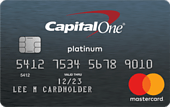
The Capital One Platinum card offers a no-frills basic credit card. There’s no rewards, no annual fee, and no foreign transaction fees. It’s a basic credit card without any fees dragging you down.
For building credit, it’s a fantastic option. Especially without annual or foreign transaction fees. When a card doesn’t have rewards, it’s really important to avoid fees since every dollar comes straight out of your pocket.
Yes, there aren’t any rewards but it’s a real bonafide credit card without any downsides.
Even better, you’ll get a higher credit line after making your first 5 month payments on time. Usually, you have to call credit card companies and ask them to increase your credit and justify it with a higher income. Having a built-in credit increase will help you increase your credit score even faster.
When I was starting out, I would have been thrilled to get this card.
*Terms apply – Learn how to apply online.
Capital One QuicksilverOne Cash Rewards
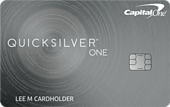
If you can get this card, get it.
The rewards are as good as they get outside of the top tier cards that require great credit scores.
You’ll get 1.5% cash back on every purchase. For context, the best cash back cards give 2%. So this card is close to the top.
There aren’t any bonus or rotating categories to worry about either. You’ll get a straight 1.5% cash back on every purchase. I love simple cash back cards like this because I don’t have to manage anything. I spend, I get cash back rewards, that’s it.
Your credit limit will also go up after you make your first 5 month payments on time. Part of your credit score is determined by your “credit utilization” which is a fancy way of saying what percentage of your total credit limit you use at any given moment. The lower the percentage, the better. So having a high total credit limit means you’ll use a small percentage and improve your credit score faster.
It does have a $39 annual fee. As long as you spend $2600 on your card each year, you’ll come out ahead and earn more in rewards than you spend on the annual fee. That comes to about $220/month in credit card spending.
One other perk: Capital One has an upgraded version of this card called the Capital One Quicksilver. It’s the same card without an annual fee and has a lower APR. The catch is that you’ll need a higher credit rating in order to get it. Once you’ve used the QuickSilverOne for awhile and built up your credit score, you should have an easier time upgrading to the better version since the card is at the same bank you already have a history with. Once your credit is high enough, this simple upgrade will give you one of the best cash back cards out there.
*Terms apply – Learn how to apply online.
Capital One Spark Classic (Business)
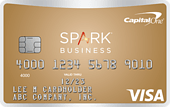
Business credit ratings work a bit differently than personal credit ratings. Each rating agency uses their own method, businesses have their own credit ratings, and your personal credit rating can be used as a substitute for your businesses’ credit rating.
Even if you have a great credit rating personally, you might have to start from scratch with your business. And a poor personal credit rating can negatively impact the rating of your business.
If you find yourself needing to improve the credit rating of your business, try to get the Capital One Spark Classic.
It’s a simple and solid rewards card for businesses with average credit ratings.
You’ll earn a straight 1% cash back on every purchase. Yes, other cash back cards have higher percentages but you’ll have a much easier time getting approved for this card. No hoops to jump through either. No rotating or bonus rewards categories to remember.
There isn’t an annual fee to worry about and no foreign transaction fees.
It’s a super simple card with a decent cash back amount for businesses that need to build their credit some more before going after the premium cards.
*Terms apply – Learn how to apply online
Capital One Secured Mastercard
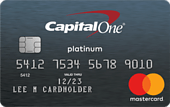
The Capital One Secured Mastercard is my favorite secured card.
This is still a credit card so it has the same impact on building your credit rating as any normal credit card.
The difference is that you’ll put down a deposit of $49-200. The deposit stays with the bank and can be taken if you go delinquent. As long as you stay on top of your credit card payments, you’ll get the deposit back if you ever close the account.
Credit lines start at $200 and go up after your first 5 monthly payments that are made on time. If you need more credit each month, you can pay some of it off with an extra payment so you can keep using your card.
And there’s no annual fee or foreign transactions fees.
There’s no gotchas or tricks. You put a deposit down, you get a credit card, then you start rebuilding your credit. Nice and simple.
If you’re rebuilding your credit and don’t have access to other cards, I highly recommend this one. It’s a fantastic card to start with.
*Terms apply – Learn how to apply online.
Discover it Secured
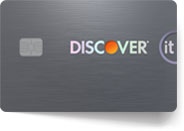
To get rewards with a secured card, get the Discover it Secured. Rewards are really rare with secured cards.
You’ll get 2% cash back at gas stations and restaurants up to $1000 in purchases each quarter. You’ll also get 1% cash back on all other purchases.
Those are decent rewards on their own and they’re fantastic for a secured card.
Since it’s a secured card, you’ll need to put down a deposit of at least $200. A $200 deposit gets you a $200 credit line and a $500 deposit gets you a $500 credit line.
Once you’ve used the card responsibility over a long period, you’ll get the option to convert the card into a non-secured card. These reviews happen automatically every month starting at 8 months after getting the card.
There’s no annual fee either.
And all the cash back that you earn the first year will be matched by Discover. So the cash back for your first year is doubled. It’s a nice bonus.
Like all Discover cards, it has the downside of not being accepted everywhere. If it’s your primary card, make sure you have another card with you even if it’s a debit card. It will be turned away by businesses on a regular basis.
*Terms apply – Learn how to apply online.
Indigo Mastercard

The Indigo Mastercard is a normal credit card and there’s no deposit required like the secured credit cards.
If you have poor credit, it can be risky to keep applying to different credit cards, hoping one of them approves you. Every application dings your credit rating a bit. That’s the last thing anyone wants when their score is already low.
The Indigo Mastercard does a quick, 60 second pre-qualification for you that doesn’t impact your credit score. This is super helpful when you’re trying to rebuild your credit. You’ll find out if you can get access to this credit card without having to risk lowering your credit score.
This “pre-qualification” isn’t a guarantee though, it’s an initial prediction on whether you’ll be approved. You’ll only get the real answer once you officially apply and they do a real credit check.
Watch out for the variable annual fee. Depending on your credit score, you’ll get an annual fee between $0 and $99. Since this card doesn’t have any rewards, that annual fee comes straight out of your pocket and there’s no way to earn it back.
You’ll find out what the annual fee is when you complete their pre-qualification process.
If you get an annual fee, you’ll be better off going with a secured card which allows you to get your deposit back. You only have to pay the deposit on a secured card once. With the Indigo Mastercard, you’ll have to pay the annual fee every year.
But if a secured card isn’t an option for you and this is the only credit card that will approve you, it is an option. And paying it off consistently will allow you to build credit. Sooner or later, you’ll be able to switch to a better card. Just keep in mind that you’ll eat the annual fees along the way.
Also watch out for the 1% foreign transaction fee. That will add up while traveling.
*Terms apply – Learn how to apply online.
Credit One Bank Platinum Visa
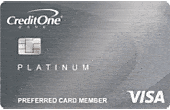
Not many cards offer cash back rewards card to folks with lower credit scores. Credit One Bank Platinum Visa does.
You’ll get 1% cash back on these categories:
- Gas
- Groceries
- Services such as mobile phone, internet, cable, and satellite TV
That’s pretty amazing.
But be careful with this card. There is a catch.
There’s a variable annual fee of $0 to $99 depending on your credit rating. Normally, this would be fine with a rewards card. But the cash back on this card only applies to gas, groceries, mobile phone, internet, cable, and satellite TV. If you get stuck with the $99 annual fee, you’ll need to spend $9,900 every year on these categories. That’s a lot for gas, groceries, and a few monthly bills.
If you don’t spend enough to earn the cash back to cover the annual fee, you’ll be paying for the privilege to use this card. When you’re building credit, every dollar counts and I’d consider other cards before going this route.
Hopefully, you’ll get an $0 annual fee on this card and it won’t be an issue.
One other perk: Credit One Bank regularly evaluates your account in order to give you a credit line increase as soon as you’re ready. This makes it a lot easier to increase your total credit limit, lower your credit utilization, and increase your credit rating faster.
Lastly, you can pick the due date for your card. This is super helpful when balancing bills. I recommend picking a day right after your second paycheck of the month (assuming you get paid twice per month). Your first paycheck will go to rent while your second paycheck can cover your monthly credit card bill.
*Terms apply – Learn how to apply online.
Discover it Student Cash Back
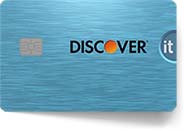
The Discover it Cash Back is the best of the “rotating cash back cards.” These cards cycle through different purchase categories each quarter. During that quarter, the purchase category earns 5% cash back. One quarter will be gas stations, another will be Amazon.com, etc.
A 5% cash back is super high when the standard is usually 1-2%. In exchange for the higher reward percentage, you’ll have to remember the difference promotional categories as they change. For myself, I avoid these types of cards. It’s just too much hassle to manage for me. But if you want to maximize your rewards, this is the way to do it.
You will also earn 1% cash back on all other purchases which is decent for a student card.
I’m not the biggest fan of first-year promos. They come and go quickly, I don’t like choosing cards based on them. But this card does have a promotion that’s worth mentioning. For the first year, Discover will match the total cash back that you’ve earned with no limit. That’s pretty cool. Again, don’t choose this card just for the first year promotion but it is a nice perk.
The card also has a good grade award. You’ll get $20 in statement credit each year your GPA is 3.0 or higher for up to 5 years. I would have gladly used that money to buy myself an extra burrito and some beer when I was in college.
You won’t have an annual fee with this card.
There aren’t fees for missing your first payment and the APR won’t change for late payments either. But if you’re taking advantage of these perks, you need to work on better credit card habits. Credit cards really slow down your ability to build wealth and a better credit rating if you don’t pay them off every month. So I wouldn’t consider these to be perks.
Remember that this is a Discover card so businesses will refuse to accept it somewhat regularly. Make sure you have another credit or debit card on you just in case.
*Terms apply – Learn how to apply online.
Discover it Student Chrome
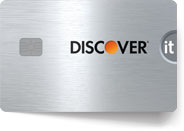
If you want to avoid rotating cash back categories and still get some bonus cash back, this is a great option.
You’ll earn 2% cash back at gas stations and restaurants on up to $1,000 in combined purchases each quarter. If you max this out by spending $4000 on these categories per year, you’ll get $80 cash back.
When I was in college, restaurants and gas were definitely some of my biggest spending categories. This card would have been a great fit for me.
Like some of the other Discover Student cards, it does have a great first-year promotion. Discover will match all the cash back that you earn in the first year, that doubles your cash back rewards for one year. That’s a great perk. Just remember, promotions come and go quickly so don’t sign up for this card just for the promotion.
You’ll also get a statement credit of $20 ear year your GPA is 3.0 or higher. This lasts for up to 5 years after you get the card. That’s another $100 of potential rewards.
There’s no annual fee to worry about.
While you won’t get a late fee for your first late payment and the APR won’t increase from late payments, I strongly encourage you not to take advantage of these perks. Paying late is a horrible habit to get into and you’ll lose a tremendous amount of money to interest charges if you carry a balance. Your credit score will also get trashed from late payments, making car loans and mortgages much more difficult later on. It’s better to skip credit cards entirely and just use a debit card if you carry a balance or pay your credit cards late.
There is one major downside to this card: it’s a Discover. On a regular basis, businesses won’t accept the card. Make sure to have another Visa or Mastercard on hand even if it’s just a debit card.
*Terms apply – Learn how to apply online.
Journey Student Rewards from Capital One
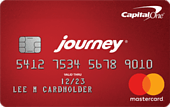
If I could go back and choose a card when I started college, I would pick this card. It’s simple, has a solid cash back rate, and no fees to worry about.
It’s everything you could want from your first rewards card.
You’ll earn 1% cash back on every purchase. That gets bumped to 1.25% when you pay on time. You should be taking advantage of this bonus every single month, get in the habit of always paying off your credit card on time. It’s the only way to get any value from your rewards. Otherwise the interest charges will devour any cash back that you earn.
No annual fees to worry about. And no foreign transaction fees either. You can spend without having to worry about either.
It also has the option to pick your monthly payment date, this is helpful when you want to align your credit card payment with when you get paid.
And once you make your first 5 payments on time, you’ll automatically get a higher credit line. This helps you build your credit score faster which comes in handy when you apply for a car loan or a mortgage down the line.
I highly recommend this card for students, get it if you can.
*Terms apply – Learn how to apply online.
Deserve Edu MasterCard for Students

When you sign up for the Deserve Edu MasterCard, you’ll get one year of Amazon Prime for Students for free (a $59 value). To be honest, this perk isn’t that amazing. It’s a nice little bonus but don’t pick the card for this perk alone. One year goes by pretty fast.
It’s still a great card though.
Getting a 1% cash back on all purchases as a student is an amazing deal.
The real benefits from this card come from what’s NOT required:
- No SSN required = perfect for international students studying in the US
- No credit history required = perfect for students that have never had a credit card before
- No deposit required = perfect for students without cash on hand
- No cosigner required = perfect for students that don’t want to involve their families
And no annual or foreign transaction fees either.
For students that need to get their first card and need some flexibility on the application, this card is a fantastic option.
*Terms apply – Learn how to apply online.
Advertiser Disclosure: I Will Teach You To Be Rich has partnered with CardRatings for our coverage of credit card products. I Will Teach You To Be Rich and CardRatings may receive a commission from card issuers.
The best credit cards for building credit in 2019 is a post from: I Will Teach You To Be Rich.
